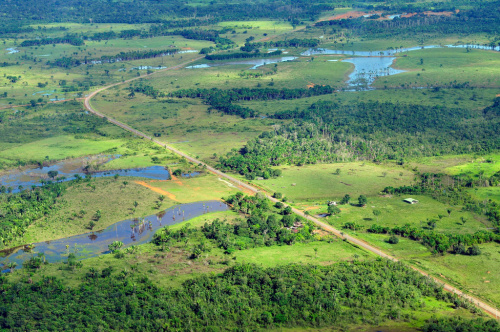BRAZIL, Rio de Janeiro (18 June 2012)_Strict law enforcement in the Brazilian Amazon has seen deforestation rates plummet, yet the government “must go beyond enforcement” and reform land use policies to restore millions of hectares of degraded land vital for the sustainable management its forests, said an expert at a CIFOR side event at the Rio+20 summit.
“After all the efforts by the government and the private sector to reduce deforestation through better monitoring, why is 700, 000 hectares still lost each year? Land clearing for agriculture is still happening while 11 million hectares of land are going to waste”, said Paulo Barreto from Imazon.
“For efficient land use, you must go beyond enforcement and address issues that encourage poor land usage such as weak land tenure and ineffective land taxes, as well as ensure stable environmental laws, and the improvement of infrastructure in areas already heavily settled, and training for people to manage their land effectively,” he added.
In the Amazon region agricultural productivity reamins low as the majority of smallholders produce for subsistence and local markets. Reforming land use polices to increase agricultural production and reduce deforestation could protect Brazil’s last remaining forests and improve livelihoods.
In particular, he argued, the government should focus on using degraded lands for agricultural intensification: increasing agricultural yields of soy, maize and palm oil, through the use of new technologies and fertilisers, or through increased cattle ranching. Some of the deforested areas should also be restored because many are not suitable for agricultural purposes; for example, if the soils are prone to erosion or excessive rainfall.
“It’s about land suitability and using the land as effectively as possible,” he added.
The recommendations echo previous CIFOR research in Indonesia that suggests that the expansion of palm oil on 30 million hectares of degraded land, increasing agricultural productivity and improving forest governance, could reduce deforestation at the same time as helping Indonesia to reach its 7% target for economic growth.
However, unlike Indonesia, Brazil has a proven track record of being able to meet both the challenges of reducing deforestation whilst encouraging sustainable growth.
According to FAO between 2000 and 2005, deforestation caused by agricultural production contributed to 42% of global forest loss, however better monitoring and enforcement, increased fines for illegal activities, the confiscation of goods associated with illegal logging and deforestation as well as an increase in the number of protected areas, has seen deforestation drop by up to 70%.
Improving agricultural production techniques has also proved successful.
A recent EDR report states that agricultural yields per hectare in the Cerrado and the Amazon basin has increased by 157% over the past 30 years. The increase was due to investments in crops that were adapted to the particular climate andsoils of the region, and the use of large tracts of unused land suited to mechanised agriculture.
Barreto’scomments come during the Rio+20 sustainable development conference this week where 120 heads of state will get together to discuss how to meet the increasing demands for food and fuel whilst sustainably managing resources and adopting greener low carbon alternatives.
“A green economy is about using resources sustainably yet in the Amazon so much is going to waste,” he added.
A number of challenges need to be overcome, he argued, to ensure that the government reforms land use policies that allow people “’to grab and hold land with very little cost.”
For example, in the Amazon there is a “quasi-open” access to land where people deforest public lands to claim ownership, expecting that in the future the government will grant land tenure titles; weak tax laws allow people to pay less income tax when they invest in rural areas, and a failure to collect fines for those who do not, as the state requires, increase productivity on their land.
The government must also put the necessary legislation in place to ensure that people can invest and expand in future livelihood opportunities.
“Knowledge is a big issue: there is an 80% illiteracy rate which means it is difficult for small holders to access new technologies. Also, with 300,000 people without access to clear land tenure, they are less likely to take risks when it comes to expanding production” he added.
“Brazil has advanced but there is still long way to go. This is a very good moment for the government to incorporate the lessons learnt from land use planning” he concluded.
We want you to share Forests News content, which is licensed under Creative Commons Attribution-NonCommercial-ShareAlike 4.0 International (CC BY-NC-SA 4.0). This means you are free to redistribute our material for non-commercial purposes. All we ask is that you give Forests News appropriate credit and link to the original Forests News content, indicate if changes were made, and distribute your contributions under the same Creative Commons license. You must notify Forests News if you repost, reprint or reuse our materials by contacting forestsnews@cifor-icraf.org.
